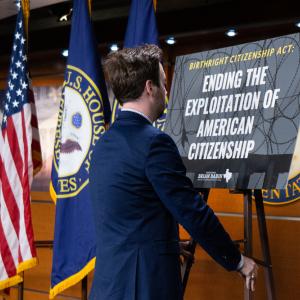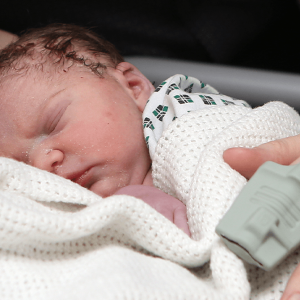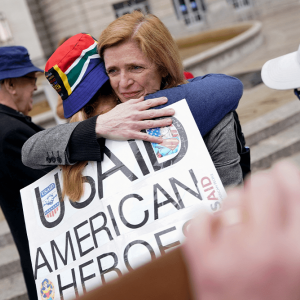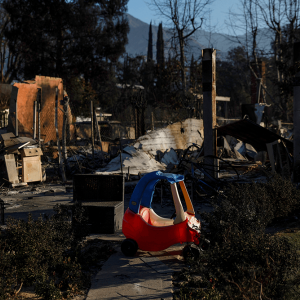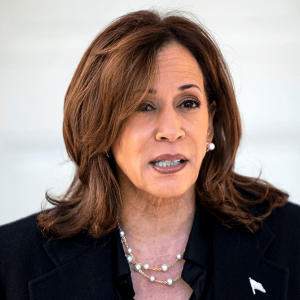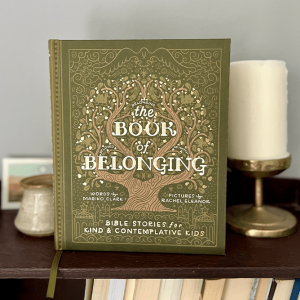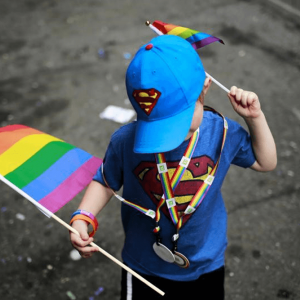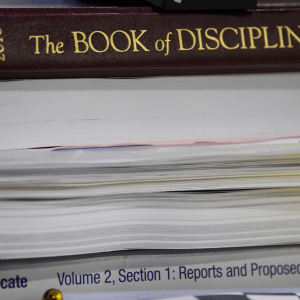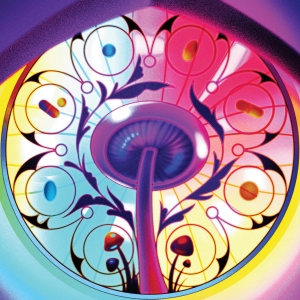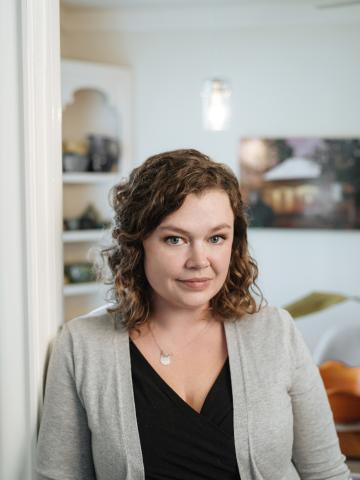
Bekah McNeel is a freelance journalist living in San Antonio. She reports on the intersection of faith and early childhood for Sojourners. In addtion, she reports on education, immigration, and religion and has been published with Christianity Today, Texas Monthly, and Texas Tribune. She is the author of Bringing Up Kids When Church Lets You Down: A Guide for Parents Questioning Their Faith, from Eerdmans. She can be found on Twitter at @BekahMcneel and on her blog at www.bekahmcneel.com.
Posts By This Author
Birthright Citizenship Is Under Attack. Christian Leaders Are Trying to Defend It
From the first day of his administration, President Donald Trump has sought to end birthright citizenship, meaning that being born on U.S. soil would no longer be sufficient for establishing permanent legal status in the country.
So far, three different judges have blocked the executive order Trump issued on Jan. 20, which the administration has appealed to the Supreme Court. Legal scholars have pointed to over a century of jurisprudence to indicate that birthright citizenship is too well established to effectively challenge. Despite the history, the Trump administration’s attempts have ignited small-scale debates about birthright citizenship, a debate faith leaders say has too often failed to consider the ethical and moral implications of revoking it.
DOGE and Trump Threaten AIDS Program That ‘Kept a Generation Alive’
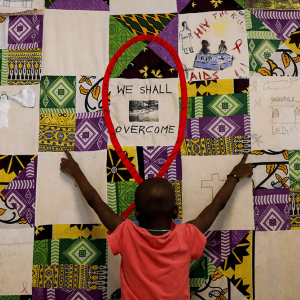
A child plays at an advocacy wall after receiving a dose of antiretroviral ARV drugs used to prevent HIV from replicating, at the Nyumbani Children’s Home, which cares for more than 100 children with HIV, whose parents died of the disease, while providing them with housing, foster care, and PEPFAR supplies of antiretroviral drugs that accelerate progress toward achieving HIV/AIDS pandemic control, in Karen district of Nairobi, Kenya Feb. 12, 2025. REUTERS/Thomas Mukoya
Steve Hoyt didn’t go to the Amecet children’s home in Soroti, Uganda, looking for a child to adopt. The missionary, engineer, and father of two went to the home for orphaned and abandoned children run by the Christian organization Youth With A Mission, to check on a child as a favor for an employee. While he was there, he noticed a baby — he guessed she was about 18 months old — languishing despite the care of the nurses.
Where Is the Spiritual Support for People Trying to Conceive?
As a homebirth midwife struggling with infertility, Abby Hall Luca intimately knows the gaps in fertility and maternity care. For 12 years she guided couples through the journey of growing their families while not being able to grow her own.
Faith Aid Groups Say Trump and Musk Have Permanently Damaged USAID
On Feb. 13, a federal judge ordered the Trump administration to unfreeze the billions of dollars in life-sustaining foreign aid suspended by executive order in January. The order, which cited “enormous harm” to global networks of relief agencies and the populations they serve, was met with relief by Christian anti-poverty and anti-hunger ministries. But even amid relief, the chaos of the last month has been relentless, say direct aid providers like World Vision and advocates like Bread for the World.
The LA Fires Devastated The Best Defense Against Child Poverty
When Shimica Gaskins first saw the single-story green ranch style house in Altadena, Calif., she wasn’t in love with the color. But she was in love with Altadena, a community where the Black middle class was not only thriving but creating the kind of social fabric where she and her husband dreamed of raising their two kids. Eight years later, the citrus trees, native plants, and family memories had made the little green house a home. And then it burned down.
I Didn’t Tell My Kids About Santa, Neither Did These Parents
In my favorite home video ever, it’s 2020 and my kids are opening their Christmas morning gifts while wearing new ski jackets, even though it was 75 degrees in South Texas, where we live. My son’s 4-year-old hands are still pudgy, and he hasn’t learned to glide his “l” sounds yet, so his raspy morning voice is extra adorable. As he unwraps his gifts, he shouts and cheers and stares at some Power Rangers in adoration.
Harris Declines to Consider Religious Exemptions for Abortion Laws
In an interview with NBC’s Hallie Jackson on Tuesday, Vice President Kamala Harris suggested she would not make concessions for religious exemptions on abortion laws, one of her strongest allusions yet to where she plans to take the abortion debate if she wins the White House in November.
Faith Groups Respond to Biden’s Proposal to Expand Contraception Coverage
The Biden administration's proposal to require private insurance agencies to cover certain over-the-counter contraceptives is getting nods of approval from faith-based reproductive rights advocates. But it’s unclear how other religious groups will respond.
The Long-Anticipated, Inclusive, Children’s Story Bible
Early in The Book of Belonging, a long-anticipated children’s story Bible, author Mariko Clark includes this paragraph: “Think about how cozy and special you feel when someone asks you about your day or wants to learn more about your favorite foods or hobbies. God made us to belong with God! That means God wants to be close and cozy with us. So all questions are welcome!”
Harris Says ‘One Does Not Have To Abandon Their Faith’ To Support Abortion Rights. What Does That Mean?
As Vice President Kamala Harris and former President Donald Trump discussed abortion policy during their first debate, Harris vigorously defended her vision for federal abortion rights. While she did, she returned to a talking point meant to appeal to religious voters.
“[Under Trump’s abortion bans] a survivor of a crime — a violation to their body — does not have the right to make a decision about what happens to their body next. That is immoral,” Harris said, before connecting morality and faith. “And one does not have to abandon their faith or deeply held beliefs to agree: The government, and Donald Trump certainly, should not be telling a woman what to do with her body.”
Harris’ Policy Agenda Could Reduce Child Poverty, Faith Advocates Say
About a month into her presidential campaign, Vice President Kamala Harris has begun to reveal glimpses of her proposed White House policy agenda. The big-ticket items — child tax credits, housing incentives, and inflation relief on groceries — are aimed at the segment of the population most affected by the skyrocketing cost of living: young working families. It’s a focus child welfare advocates are welcoming.
Infant Loss Is Tragic and Complex. Abortion Bans Made it Worse
In the late spring of 1995, Rebekah Mitchell went into the hospital at 27 weeks pregnant with her second child. Mitchell had a kidney disease that was affecting her own health and the health of the baby. She made it to seven months, and then the baby, whom she and her husband had already named Jonathan, became entangled in the kinked umbilical cord, and died suddenly. Stunned and recovering from the cesarean section required to deliver Jonathan, she kept his body with her in the hospital room for three days.
Mennonites March and Face Arrest to Protest Israel’s Genocide in Gaza
Starting on Thursday, July 18, between 35 and 125 Mennonites and interfaith allies from the U.S. and Canada made steady progress on their 11-day, 141-mile “All God’s Children March for a Ceasefire” trek from Harrisonburg, Va., to Washington, D.C. Upon arrival in Washington on Sunday, July 28, the marchers urged Congress and President Joe Biden’s administration to support an immediate, permanent ceasefire, the release of all hostages and political prisoners, an end to military aid to Israel, and a political solution that ends the occupation of Palestine, ensuring peace for Palestinians and Israelis. And on Tuesday, July 30, 46 of the people were arrested by Capitol Police during a protest.
A Christian Adoption Agency Resists the Rise in Anti-LGBTQ+ Laws
For years, Dietz Osborne and his colleagues at Miriam’s Promise adoption agency in Nashville, Tenn. had quietly worked with LGBTQ+ couples looking to adopt children. It was not something the United Methodist-affiliated agency advertised or promoted, but when a same-gender couple came to them, Miriam’s Promise unassumingly welcomed them as clients.
Kids Books to Teach Children About an Expansive, Inclusive God
Daneen Akers faced a dilemma: After moving away from fundamentalist Christianity, what books about God could she read to her kids? She went through the boxes in her parents’ basement, full of the books she’d grown up with — books that used exclusively male pronouns for God and talked about Jesus’ blood satisfying a debt owed for humanity’s sins. “The faith stories I had inherited, a lot of us had inherited, were just not sufficient. I wanted something expansive,” Akers said.
United Methodists Pass Petition Supporting Abortion Rights
The United Methodist Church voted this week to approve a petition affirming a right to abortion and pledging “solidarity with those who seek reproductive health care.” The vote was part of the UMC’s 2020 General Conference, which was delayed until 2024 because of the COVID-19 pandemic.
Risk, Uncertainty, and Anguish as Families Navigate IVF Bans
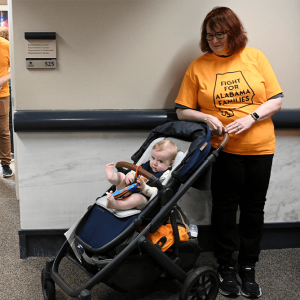
Grandma Audrey O’Neil, watches over 7-month-old Mason Deleeuw as his parents Peter and Meredith Deleeuw of Huntsville, lobby lawmakers for support of legislation safeguarding in vitro fertilization (IVF) treatments at the Alabama State House in Montgomery, Ala., Feb. 28, 2024. Mason, was conceived after five rounds of IVF treatments for the Deleeuwes. REUTERS/Julie Bennett
The waiting room of a fertility clinic was one of the most sacred places Elizabeth Wanczak had ever experienced. Most of the people sitting around her had weathered trauma and grief like hers — stories of repeated miscarriage, medical catastrophe, and what felt like endless longing for a baby that had not yet come. And yet, she said, the presence of these people in the waiting room signaled hope. They had not yet given up.
At Christian Colleges, Does Learning Clash With Religious Mission?
Rachel Carbonneau didn’t show up to Catholic University of America in late January planning to talk about abortion. The doula and public health advocate was visiting a class for aspiring nurses, doctors, and other public health professionals to talk about social determinants of health — the ways that economics, community structure, bias, and institutions affect health outcomes. The student-led conversation had touched on a wide range of topics from the opioid crisis, to the fact that Black birthing people in New York are five times more likely than their white counterparts to die in childbirth, to the impact of COVID-19 on placental health.
What Do Christians Need To Know About Psychedelics?
IT WAS DARK. Totally dark and empty. Andrea Smith felt a familiar hopelessness. “Of course I’m all alone,” she thought. “It’s my greatest fear.”
Smith, a pastor in the United Methodist Church, was at the Johns Hopkins Center for Psychedelic and Consciousness Research in Baltimore, in the first moments of a psilocybin trip designed for clergy.
“I didn’t know crap about psychedelics leading into it,” Smith told Sojourners. Through work with the center before her 2019 experiment with psilocybin (a psychoactive ingredient found in some mushrooms), she was prepared to possibly meet her greatest fears — some participants even reported seeing their own death. At first, that’s exactly what happened.
Smith’s profound childhood trauma — her mother suffered a fatal aneurysm in front of her at age 9 — had instilled an existential fear of being alone, she realized, which had led her to the brink of self-destruction. Burnt out in ministry, avoiding the truth about her husband’s infidelity, and grieving the death of her father, Smith entered the Johns Hopkins study in a fog of depression. She was considering returning to the antidepressants she’d stopped years before. “I was broken,” Smith said. “I was just exhausted and spent.”
During Smith’s psilocybin treatment, something shifted. She described moving “in and through” increasingly abstract and light-filled imagery that led her on what was ultimately, she said, a journey of redemption and forgiveness. She never got back on antidepressants, because the depressive fog lifted almost immediately after her psilocybin treatments. Smith credits the psilocybin experience with her ability to make major life changes.
The scientists at Johns Hopkins paved the way for contemporary research into the unique pharmacological properties of organic and synthetic compounds known collectively as “psychedelics.” In 2000, the Johns Hopkins team obtained the first regulatory approval in the U.S. to restart research into psychedelic use with healthy voluntary subjects. In 2006, the team published the first wave of results on the “safety and enduring positive effects of a single dose of psilocybin,” which helped catalyze a worldwide resurgence of psychedelics research.
Why Are Catholic Hospitals Cutting Labor Units During a Maternal Mortality Crisis?
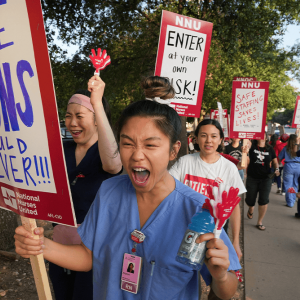
Registered Nurse Alyson Wong marches on a picket line with striking nurses at Ascension Seton Medical Center in Austin, Tezas, on Tuesday June 27, 2023. Hundreds of nurses at the hospital participated in a one-day strike to call attention to what they describe as a staffing crisis and dismissive conduct by hospital administrators during contract negotiations.
One of the most troubling statistics in the country — the United States’ skyrocketing maternal mortality rate — isn’t much of a mystery to those who work in labor and delivery rooms. Underfunding, gaps in health care coverage, and hospital closures all contribute to the health care system’s state of crisis: When resources are stretched thin, birthing people, particularly Black and Latino people, and their babies don’t get the care they need.
